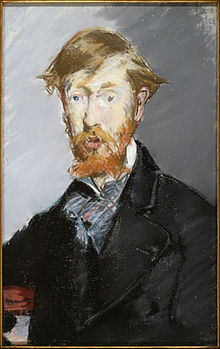George Augustus Moore
| George Moore | |
|---|---|

Portrait by Édouard Manet, 1879
|
|
| Born | George Augustus Moore 24 February 1852 Moore Hall, County Mayo, Ireland |
| Died | 21 January 1933 (aged 80) London, England |
| Resting place | Castle Island, County Mayo, Ireland |
| Occupation | short-story writer, poet, art critic, memoirist and dramatist |
| Language | English |
| Alma mater | National Art Training School |
| Period | 1878–1933 |
| Literary movement | Celtic Revival |
| Notable works | Confessions of a Young Man, Esther Waters |
| Relatives |
John Moore (granduncle) Maurice George Moore |
George Augustus Moore (24 February 1852 – 21 January 1933) was an Anglo-Irish novelist, short-story writer, poet, art critic, memoirist and dramatist. Moore came from a Roman Catholic landed family who lived at Moore Hall in Carra, County Mayo. He originally wanted to be a painter, and studied art in Paris during the 1870s. There, he befriended many of the leading French artists and writers of the day.
As a naturalistic writer, he was amongst the first English-language authors to absorb the lessons of the French realists, and was particularly influenced by the works of Émile Zola. His writings influenced James Joyce, according to the literary critic and biographer Richard Ellmann, and, although Moore's work is sometimes seen as outside the mainstream of both Irish and British literature, he is as often regarded as the first great modern Irish novelist.
George Moore's family had lived in Moore Hall, near Lough Carra, County Mayo for almost a century. The house was built by his paternal great-grandfather—also called George Moore—who had made his fortune as a wine merchant in Alicante. The novelist's grandfather was a friend of Maria Edgeworth, and author of An Historical Memoir of the French Revolution. His great-uncle, John Moore, was president of the Province of Connacht in the short-lived Irish Republic of 1798 during the Irish Rebellion of 1798. The novelist's father, George Henry Moore, sold his stable and hunting interests during the Great Irish Famine, and from 1847–1857, served as an Independent Member of Parliament (MP) for Mayo in the British House of Commons. George Henry was renowned as a fair landlord, fought to uphold the rights of tenants, and was a founder of the Catholic Defence Association. His estate consisted of 5000 ha (50 km²) in Mayo, with a further 40 ha in County Roscommon.
...
Wikipedia
